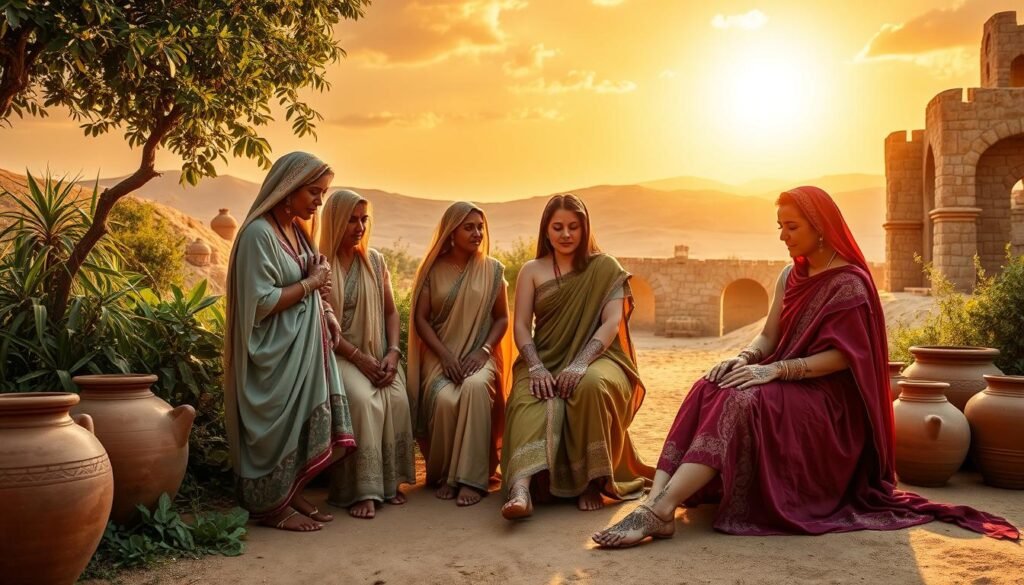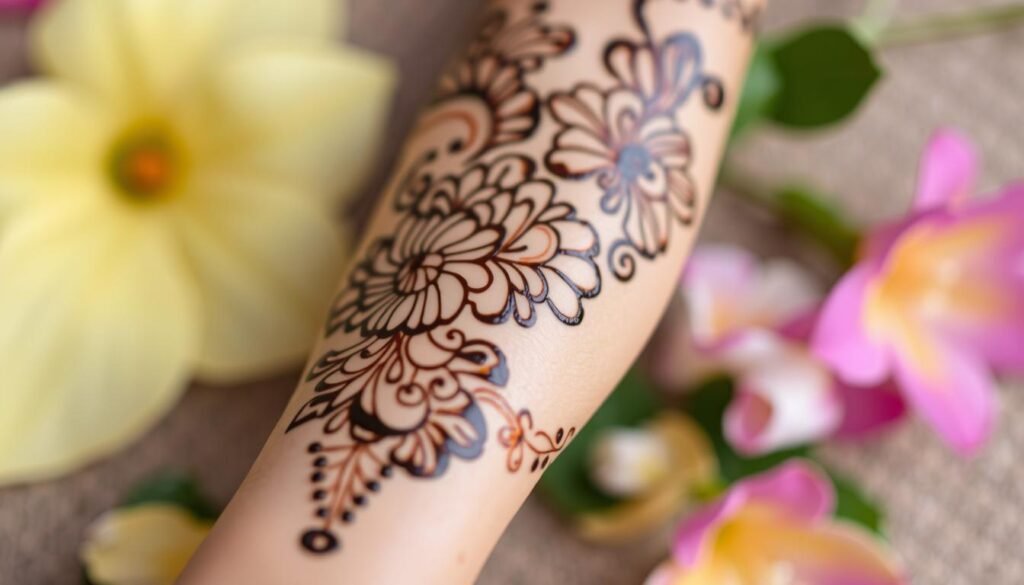Is getting henna a way to celebrate culture or a problem for Christians? This question makes many believers think hard. They try to figure out where faith and art meet.
Henna is different from tattoos because it’s temporary. It’s okay in many cultures, unlike tattoos which some people worry about. Henna has been around for over 6,000 years in places like Africa, Arabia, and India.
It’s important in many religions. We will look at how Christians see henna today. We’ll talk about its history and what it means for faith now.
Understanding Henna: A Cultural Overview
Henna has a long history, dating back thousands of years. It grows mainly in places where it thrives. This natural dye is used for decoration and health.
The cultural significance of henna goes beyond looks. It’s a big part of many celebrations. People from different cultures use henna to show their creativity.
Historical Significance of Henna
Artisans have used henna for over 9,000 years. It was first used by ancient Egyptians. Henna was used for body art and to treat sicknesses like ringworm.
In today’s world, henna is key in cultural events. In South Asia, it shows the strength of relationships. Weddings and holidays often include henna, showing its lasting importance.
Henna’s Global Presence Across Religions
Henna is important in many religions. It’s loved by Islamic and Hindu cultures. But it’s also used in Jewish and Christian celebrations.
This shows henna’s role in bringing cultures together. Even in Christian communities in places like Armenia and Palestine, henna is celebrated. It adds to cultural expressions without being too religious.
The Intersection of Faith and Artistry
Henna art is a deep way to show culture and beauty. It changes a lot from one place to another. In South Asia, henna designs are big and full of meaning, especially at weddings.
In North Africa, henna designs are simpler. They mean joy and togetherness at celebrations. These differences show how henna is a big part of many cultures.
Artistic Expressions in Different Cultures
Henna art shows how cultures express themselves through designs. It’s used in many important events. For example, henna is key at weddings, bringing good luck and keeping evil away.
This shows how henna is tied to big moments in life. It adds meaning and tradition to every design.
The Role of Henna in Religious Celebrations
Henna is important in many religious events. In Muslim weddings and Eid, it means blessings and safety. It’s also used in Christian events like Christmas and Easter.
This shows henna’s role in bringing people together. It’s not just for looks, but for building community ties.
Can Christians Get Henna?
Henna has been used for beauty for over 6,000 years in the Middle East. It’s loved by many cultures, like Armenian, Indian, and Palestinian. Many Christians see henna as a way to express themselves without mixing it with their faith.
Henna as a Non-Religious Practice
Henna is different from tattoos because it’s temporary. It lets people enjoy designs without them lasting forever. This makes it appealing to some Christians who want to be creative without going against their beliefs.
Choosing to get henna should be based on personal reasons. It’s important to think about how it affects your faith and others. For many, henna is a way to celebrate culture, not religion. It lets people express themselves through art while staying true to their faith.
Henna vs. Tattoos: A Theological Perspective
Looking at henna and tattoos needs us to understand some biblical teachings. Leviticus 19 is key here. It talks about laws from a long time ago. These laws were meant to keep the Israelites different from others.
The rule against tattoos in Leviticus 19:28 seems clear. But it was really about keeping the Israelites separate. This is important when we think about body art today.
Understanding Leviticus and Its Cultural Context
Leviticus says, “Do not put tattoo marks on yourselves. I am the Lord.” This shows how the ancient Israelites kept their identity. Tattoos are more common now, but the old rules still matter to many Christians.
How we see body art and religion has changed. This makes us think about henna and its place in our beliefs.
Distinguishing Henna from Permanent Tattoos
Henna is different from tattoos because it’s temporary. It lasts a few days to weeks. This makes it a symbol, not a permanent change.
Choosing henna lets people enjoy body art without the big commitment tattoos have. It’s a way for Christians to honor God through cultural expressions.
Historical Use of Henna in Christian Communities
Henna has a long history in Christian communities. It was used for important life events. The bright designs celebrated weddings and festivals, showing both culture and faith.
Henna Traditions Among Early Christians
In early Christianity, henna was a big part of culture. Church Fathers like Clement of Alexandria and Tertullian didn’t like hair dyeing. But, henna was still used in important events.
This showed early Christians could keep their culture while being spiritual. It helped them feel connected as a community.
Modern Christian Communities Embracing Henna
Today, Christians love henna again. It’s used in holidays like Easter and Christmas. This shows a mix of old traditions and new ways to express faith.
Henna means joy and community in modern Christian life. It shows the beauty of cultural identity and faith together.
Henna in Biblical Times
Henna was special in ancient Israel. It has interesting links to the Bible. The word “kopher” might mean henna in the Song of Songs. This book talks about beauty and love.
It says henna flowers were linked to women’s beauty. They might have been part of couples’ love stories back then.
References to Henna in Ancient Scripture
The word “kopher” is in the Song of Songs, chapter 1, verse 14. It talks about henna’s smell, like grapes. This flower was seen as sexy and attractive.
Even though the Bible doesn’t say henna was used on bodies, it was important for beauty. You can learn more about henna in the Bible.
Possible Use of Henna during Jesus’ Time
In the first century, henna might have been more than just for looks. Places near Judea used henna for beauty and in ceremonies. But we don’t know for sure if it was used in Jesus’ time.
Still, henna was likely used in personal care and for special events. This shows henna’s deep role in culture. It helps us see henna’s importance today, too.

Motivations Behind Getting Henna
Henna is getting more popular. People like it for its beauty and because it’s temporary. It also connects them to their heritage. This shows how personal and cultural expressions can be both.
Personal vs. Cultural Motivation
Some see henna as a way to express themselves. They love the intricate designs. It’s like a canvas for their individuality.
Others see henna as a way to honor their culture. They know its history and use in rituals. Cultural identity is a big part of it.
Knowing where henna comes from is important. It helps bridge personal and cultural appreciation. It’s key for those new to henna to learn about its history. This way, they can respect its traditions.
Potential Concerns for Christians Considering Henna
Many Christians think deeply about body art and their faith. Getting henna makes them wonder about their choices. They ask if these choices match their Christian values.
Artistic expression is a big deal. It’s important to show who we are to others. This means being careful with our choices.
Honoring God Through Personal Choices
Thinking about henna means looking at why we want it. It’s about how our choices affect others. This is especially true for Christians.
There’s a fine line between showing who we are and misunderstanding our faith. We must think about how our actions show our beliefs. This helps us avoid confusion and share our faith better.
Impact on Community and Witness to Others
How we look can change how others see us. Using henna might confuse people about our faith. This is important because we want to be seen as we truly are.
Our choices can bring people closer to faith or push them away. Talking about the difference between henna and permanent tattoos helps. It keeps our relationships strong and positive.
Exploring Henna as a Temporary Alternative
Henna is a popular choice for body art that’s temporary. It lets people enjoy designs without a long-term commitment. This is great for those who want to celebrate their identity without lasting marks.
Advantages of Temporary Henna Designs
Temporary henna has many benefits. It lets you show off your beliefs and culture in a unique way. You can change your designs as often as you like, which is perfect for trying new looks or marking special times.
It’s also a good choice for those who don’t want permanent tattoos. Henna is a way to express yourself without worrying about lasting marks. It’s used in weddings and festivals, adding to its cultural value.

Incorporating Faith into Henna Art
Henna art has been around for over 6,000 years. It lets people from different religions, like Christians, show their faith in a special way. They can add symbols like crosses or Bible verses to their designs.
The Egyptian Copts, a Christian group, use henna to mark their wrists with crosses. This idea can inspire others to make designs that tell Bible stories. It makes henna art more than just pretty, it’s a way to share stories.
Using henna in Christian events or special times is a great way to honor faith and culture. As henna becomes more popular, especially among women in the U.S., it’s a chance to connect with others. It lets people tell their own stories through art and faith.
FAQ
Is getting henna a common practice among Christians?
Yes, many Christians enjoy henna in places like Armenia and Palestine. It’s part of their celebrations and culture, not seen as religious.
What is the historical significance of henna?
Henna has been around for over 6,000 years. It’s mainly found in the Middle East and South Asia. It’s a symbol of joy in many cultures, crossing ethnic and religious lines.
How does the use of henna differ from tattooing in Christianity?
Henna is different from tattoos because it’s temporary. It doesn’t change your skin like tattoos do. This makes it okay for Christians to try henna without worrying about tattoos’ issues.
Can Christians incorporate religious symbols into henna designs?
Yes, Christians can add symbols like crosses or Bible verses to their henna. This way, they can show their faith through art.
Does the Bible mention henna?
The Bible doesn’t directly talk about henna. But, it’s mentioned in other texts like the Song of Songs. This shows its cultural value, not its religious meaning.
What are some motivations Christians have for getting henna?
Christians might get henna for beauty, self-expression, or to connect with their culture. It’s a way to mix their faith with their love for beauty.
How should Christians consider their choices related to henna?
Christians should think about why they want henna. They should make sure it fits with their faith and doesn’t harm their witness.
What are the community perceptions surrounding henna use among Christians?
How Christians show their faith through looks matters. They should think about how henna might affect how others see them and their community.
Are there benefits to choosing temporary henna designs?
Yes, henna is great because it’s temporary. It lets people enjoy cultural or personal themes without the long-term commitment of tattoos.

Rockin’ the faith, one verse at a time!
Growing up, the Bible’s stories deeply impacted me. Now, with over 15 years of preaching experience, I blend timeless teachings with modern technology, making them relevant for today’s world.
Bible Hub Verse is my platform to share historical insights and thought-provoking articles, exploring both familiar and uncommon Christian topics. My passion is building a welcoming online space for everyone to learn, grow in their faith, and discover the Bible’s enduring message.
Join the journey!
God bless you.















